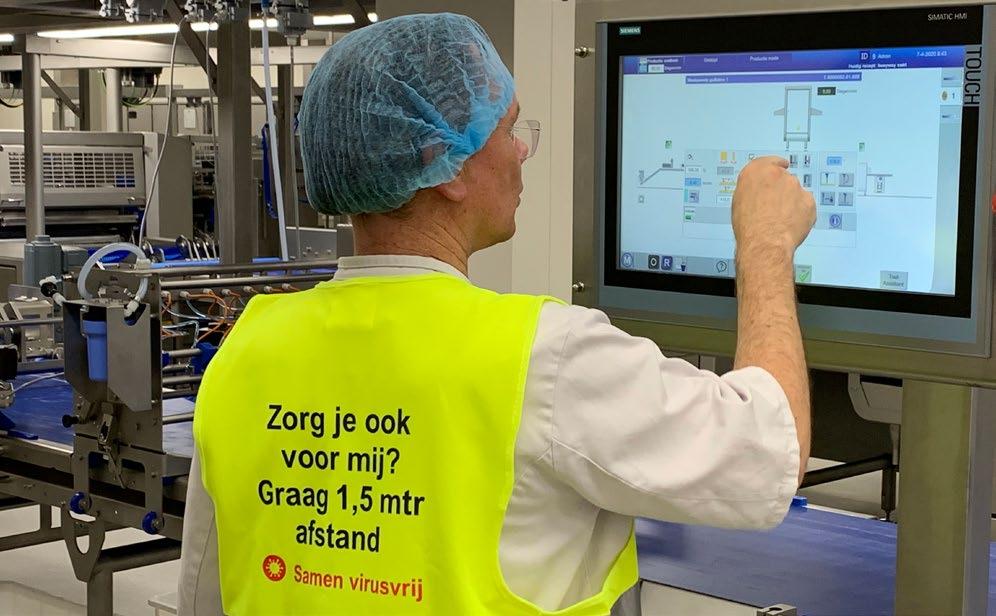
www.bakingbiscuit.com
Note: Due to the current situation caused by Covid-19, we cannot guarantee the last mile delivery of the issues. We therefore ask our readers to provide us with an email address for a digital delivery. Please contact: info@foodmultimedia.de
03 20 Ditsch The lye baked goods specialist Crisis management Corona and its impacts Production Successful turnkey solutions
The European Bakery Market 2019
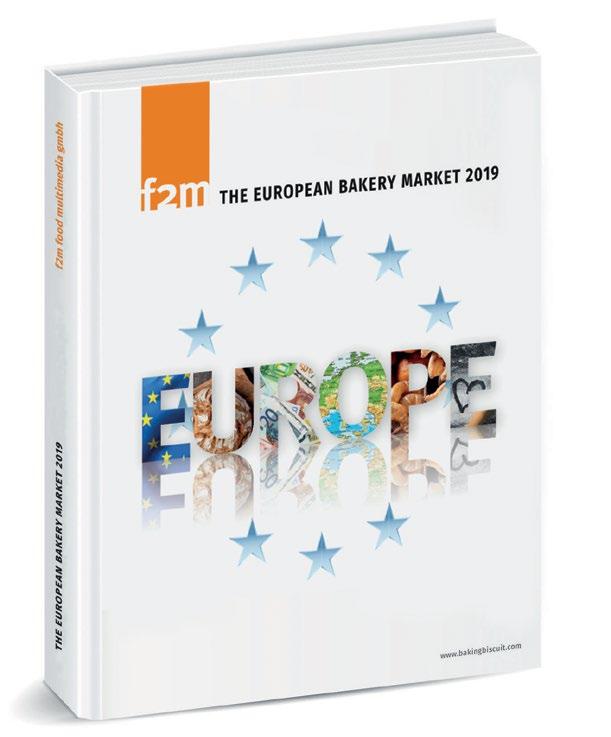
Subscribe now to baking+biscuit international and you will get a digital copy of the book for free
Please contact: Viktoria Usanova via E-mail: usanova@foodmultimedia.de
COnTENT
++ 7 Country portraits: Hungary, Poland, Romania, Slovakia, Sweden, Switzerland, United Kingdom
++ Expert Interviews: The European out-of-home market
++ Market Research: Trends and market dynamics
++ Company reports: Profiles of major suppliers to the bakery market
Hard copy • 272 pages • EUR 49 incl. VAT + delivery costs For more information, please visit our website: www.bakingbiscuit.com
f2m food multimedia gmbh Ehrenbergstr. 33 · 22767 Hamburg · Germany · info@foodmultimedia.de Phone: +49 40 39 90 12 27 · Fax: +49 40 39 90 12 29 · www.foodmultimedia.de fotolia.com © lukiv007
Dear readers,
a lot has been said and written about the Corona pandemic, but rarely in connection with the bakery industry. It is affected in a variety of ways: preventive health care for employees, lack of employees due to corona, sometimes stagnant raw material supplies, logistics problems, weeks and months of the “out-of-home” sales channel being cut off and much more. Companies in the global baking industry have mastered these problems many times, but there have been and still are companies that have been brought to the edge of their viability by the crisis.

Your commments or suggestions are always appreciated: phone: +49 40 380 94 82 email: keil@foodmultimedia.de
The difficult part is yet to come, be cause the pandemic will not simply stop and everyone will return to normal practice. On the contrary, it will bring massive changes in willingness to consume and in consumption habits and no one can say today where this journey will go, which products from which raw materials, where, produced how and by whom will determine the market - that is all not decided yet. Nor do we know how the economic structures of the industry are changing. Where will people shop and consume in the future, how and where will they want to work? How do the products get to the customer? How will the ownership of bakery businesses develop? Can we expect a big wave of concentration? How will you define efficiency in the future, in dollars, yen and euros or in sustainability?
But one thing is certain, the industry is also facing a major technological change and the pandemic will accelerate it. Digitization and automation will find their way more and more. Machines will take over jobs for which we today still need people, and algorithms will control processes. Controls via algorithms only work perfectly, however, if the relationships between the parameters are clear, the influencing variables are recorded digitally at all and the systems are consistently networked and not only within individual islands. Because many relationships have not yet been clearly defined, there will be an upswing for industry-specific research.
Artificial intelligence will also find its way into companies in the bakery industry. But be careful, so far this is only a collective term for very different systems (neural networks, non-linear regression analyzes, evolution models) that work and learn differently. Their advantage is that they can also map complex relationships because they do not draw their conclusions from "understanding the relationships", but rather determine them statistically. An AI cannot or only poorly process unforeseen influences, e.g. because a sensor breaks or another unforeseen influence occurs.
The problems facing the baking industry worldwide are huge, but also the chances of generating more knowledge and more development opportunities. It will be an exciting future. However, I will not be there. After 40 years of journalistic work on and for the industry, I will retire and wish you, dear reader, courage, creativity and enjoyment of working in such an exciting industry.
Yours sincerely,





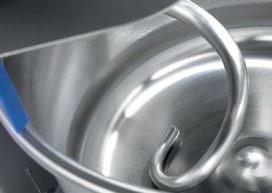

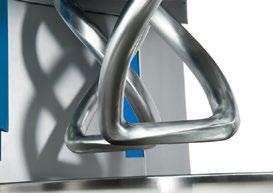
Hildegard Maria Keil
EDITORIAL
++ Hildegard M. Keil, Publisher
DIOSNA Dierks & Söhne GmbH Am Tie 23 | 49086 Osnabrück GERMANY info@diosna.com | www.diosna.com DIOSNA PRE-DOUGH & MIXING SYSTEMS A LIFELONG PARTNER for your smart, e icient Food Production Quality MADE IN GERMANY since 1885


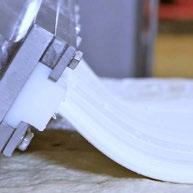
PUBLISHING COMPANY
f2m food multimedia gmbh Ehrenbergstr. 33
22767 Hamburg, Germany
+49 40 39 90 12 27 www.foodmultimedia.de
PUBLISHER
Hildegard M. Keil
+49 40 380 94 82 keil@foodmultimedia.de
EDITOR-IN-CHIEF
Bastian Borchfeld
+49 40 39 90 12 28 borchfeld@foodmultimedia.de
EDITORIAL STAFF
Helga Baumfalk
+49 40 39 60 30 61 baumfalk@foodmultimedia.de
ADVERTISING DEPT.
International sales director Dirk Dixon +44 14 35 87 20 09 dixon@foodmultimedia.de
Advertisement administration
Susanne Carstens +49 40 38 61 67 94 carstens@foodmultimedia.de
DISTRIBUTION
+49 40 39 90 12 27 vertrieb@foodmultimedia.de
TRANSLATION
Skript Fachübersetzungen Gerd Röser info@skript-translations.de
TYPESETTING
LANDMAGD in der Heide Linda Langhagen; design@landmagd.de
PRINTED BY Leinebergland Druck GmbH & Co. KG Industriestr. 2a, 31061 Alfeld (Leine), Germany
BAKING+BISCUIT INTERNATIONAL is published six times a year. Single copies may be purchased for EUR 15.– per copy. Subscription rates are EUR 75.– for one year. Students (with valid certification of student status) will pay EUR 40.– (all rates including postage and handling, but without VAT).
Cancellation of subscription must be presented three month prior to the end of the subscription period in writing to the publishing company. Address subscriptions to the above stated distribution department.
No claims will be accepted for not received or lost copies due to reasons being outside the responsibility of the publishing company. This magazine, including all articles and illustrations, is copyright protected. Any utilization beyond the tight limit set by the copyright act is subject to the publisher’s approval.
Online dispute resolution in accordance with Article 14 Para. 1 of the ODR-VO (European Online Dispute Resolution Regulation): The European Commission provides a platform for Online Dispute Resolution (OS), which you can find at http://ec.europa.eu/consumers/odr
Valid advertising price list: 2020
www.bakingbiscuit.com 03/2020 CONTENT 04 IMPRINT
cover photo: © Rademaker © BVT © Ditsch ©
–stock.adobe.com 26 30 Interview 06 Linxis Group: Individual specialization – and meaningful common grounds 24 Nowel: Development and expansion Crisis management 10 Corona : Impacts of the pandemic Raw materials handling 20 Zeppelin : Looking at the details is worthwhile Production 26 Ditsch: Lye champion 30 BVT: Turnkey solutions 32 Handtmann: Cookie production systems 34 Saltek: Synonymous with Pita Bread Lines Regulars 03 Editorial 10
Aldeca Productions
Successful snacks start here
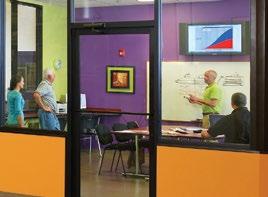

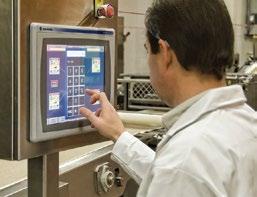

From your product idea to plant start-up, Reading Bakery Systems works side by side with you to meet your process and product challenges with innovative thinking and high quality systems and components. Our experienced people apply decades of manufacturing and food engineering expertise to help you create successful baked snack products. Our brands – Thomas L. Green, Reading Pretzel, Exact Mixing and Reading Thermal – deliver efficient, sanitary and dependable equipment. And our Science and Innovation Center allows you to test new products, formulations, equipment and processes. Contact Reading Bakery Systems to start your journey to successful snacks. Visit us at www.readingbakery.com or call (01) 610-693-5816.



READINGBAKERY.COM
Markel Food Group Company
(01) 610.693.5816 |
A
Individual specialization –and meaningful common grounds
The Linxis Group brings together five suppliers from the international baking equipment industry. Everyone acts independently. Specialist groups ensure the overall coordination and development.
+Hildegard M. Keil: 2017 Bretèche Industrie became Linxis Group with the idea to become a world leader in specialized equipment for pharmaceutical, food and s pecialty baking industry. How have your progressed toward that goal?
+ Linxis Group: Linxis Group is comprised of 5 marketleading companies in the Food and Health industries. While our position of strength can vary from one segment or region to another, our brands are recognized world-wide for their expertise and premium positioning. In that sense, we are quite pleased with our progress toward the goal but still have lots of work ahead.
+ Keil: Your portfolio combines Diosna, VMI, Shick Esteve, and Unifiller - Do you see these companies as one homogeneous company with different specializations or are they rather individual companies that work independently of one another and are sometimes even competitors?
+ Linxis Group: The answer to both questions is definitely “yes!”. As for what we “are”- we are focused on providing needed expertise in the critical steps of the manufacturing process for our food and healthcare customers. In the delivery of these process solutions we may act as individual companies, or we may work in concert to provide a seamless system. In this way, it allows us to foster the entrepreneurial spirit of our brands while also enabling us to come together as one company for our customers when there is value. For Linxis Group, we will always place the highest importance on allowing the individual brands to focus on market leadership. In this way, they can do what is best for their customers –including managing their cooperation with internal and external partners.
+ Keil: How far do the companies coordinate with each other, is there a central management level, for example in sales, services and development?
+ Linxis Group: Our organization is mostly decentralized. We have a small and agile Linxis holding team (12 people), focused on the central elements of group structure (Finance, Legal, Information Systems, Human Resources). Within that framework, we have initiatives that promote the synergies created by working together. We promote active professional communities wherein members of the Linxis team and managers from the subsidiaries are actively involved in ++ Our questions were answered by

INTERVIEW 06
Didier Soumet, CEO of Linxis Group, and …
Linxis Group
© Linxis Group
developing best practices and implementing transformative projects.
+ Keil: Can you explain to us which of the bakery-specific process steps are located at which company?
+ Linxis Group: Shick Esteve operates in dry and liquid ingredient automation from storage to dosing, including process control and traceability. Diosna offers fermentation, pre-mixing and kneading solutions, combined with sourdough strains developed by its Baking Center. Diosna serves both the food and the pharma industries. VMI provides premixing, kneading and mixing solutions in batch and continuous processes. They serve the food and cosmetic industries. Unifiller offers dosing, depositing, filling and decorating equipment for the food industry.
+ Keil: With the takeover of Unifilller, you wanted to strengthen your position in the cake and pastry industry and your presence in North America, according to your 2018 annual report. Did you succeed?
+ Linxis Group: The cake segment has experienced satisfactory growth and we are seeing increased opportunity as Unifiller cooperates with our other brands to leverage their strength in various markets and regions of the world.
+ Keil: What are the Linxis Group's development priorities with a view to iba 2021?
+ Linxis Group: While each of our brands will be working on various R&D projects to be showcased at IBA 2021, the priority of the group will be to continue to enhance our ability to support our customers globally. Our goal is to offer integrated solutions and local support to our customers wherever they operate around the world. This will include not only continued expansion of facilities but also enhanced offerings in 24/7 technical support and remote access.
+ Keil: In times of increasing digitalization and automation, it is no longer just about mechanical engineering, but also about increasing efficiency by networking the entire process. This topic cries out for cross-product collaboration and development. How far are the Linxis Group and its brands on this topic and what are the goals of your development in detail?
+ Linxis Group: Our customers expect seamless integration across our brands when they are used in a system. Fortunately, cross-product-collaboration and development is a strength of our group. As leading brands, our companies were already very used to collaborating with other suppliers in order to deliver value for our customers. Within the group, that skill is taken to a new level. Our engineering teams and project management teams know each other and know they can freely collaborate and have the same goal of efficiently delivering the best solutions for our customers.
We have seen this in action already on many projects where we connect controls platforms and develop protocol for the way we interface with one another. Across the brands our teams have a deep understanding of the way each company is

working and with whom they need to collaborate to achieve the desired outcome for a specific project. This collaboration takes place in multiple ways:
• For efficiency between companies. For example, prior to combining Shick and Esteve there were primarily two different controls platforms used; Shick was predominately Rockwell and Esteve was predominately Siemens. Now both companies have staff with proficiency in both so that we can help each other in supporting our common customers.
• For integration on a project. We have witnessed already projects where customers want a seamless integration between multiple brands. In these cases, we are able to assign a lead person for the controls integration and even have one common project manager who takes the lead on the project. This allows us to work as one company on behalf of our customers so that connection and field issues are minimized prior to the installation of the equipment.
• For efficiency of effort as an organization. As each brand was developing their own methodology around IIOT, we realized that we would be more efficient if we developed a common IIOT road map for the group. Of course, it also benefits our customers. This begins with a common understanding of what is achievable, what is desirable and what is justifiable. It also allows one brand to take on
www.bakingbiscuit.com 03/2020 07 INTERVIEW
++ … Tim Cook, Vice President of Linxis Group and CEO of Shick Esteve
© Linxis Group
development work on behalf of the entire group. In this way, our Linxis IT Manager works continuously with our group subject matter experts to develop the strategy around our IIOT offering. Finally, collaborating in this way allows us to offer seamless solutions across multiple brands, increases our own efficiency and leads to enhanced sharing of best practices within our group.
+ Keil: How do you see your customers' attitudes towards this topic? Plant control can be manual, based on algorithms or artificial intelligence. In bakery technology today, control is largely based on algorithms. Is the input of data provided by the sensors sufficient? Where do we need more knowledge about the interrelationships? Where do we need more sensor technology and where would it make sense to use AI? What would be the criteria for success?
+ Linxis Group: As you might imagine, attitudes vary greatly on this subject depending on the industry and the individual customer. While some stay focused on the topics of automation and traceability, others are interested in exploring areas of production data collection and even preventative or predictive maintenance. Certainly, we see that the pharma and cosmetic industries have a high level of desire for traceability and for process validation.
Bakery customers understand the value of traceability from ingredient handling through to the final packaged product. However, they have been very slow to invest in the type of network data collection that would allow for continuous monitoring of all aspects of production. But, we believe that this resistance to adaption is not because of what is technologically available to them but, rather, what is economically feasible and operationally understandable. We think one area of great interest is the use of simple IIOT for preventative and predictive maintenance. A simple example: we have the ability to communicate through the cloud to let the appropriate personnel know when the filter in a flour transfer system is nearing end of service. This message communicated to the appropriate maintenance personnel in the appropriate way (iPad, Smartphone, Desktop), would allow them to change the filter prior to it causing down time. The capability exists – but the baker must decide whether it is worth investing in and maintaining this feature. If the maintenance crew already has too many “blinking red lights” one more may not be productive. Likewise, many bakers will say that they expect their maintenance crew to change filters on a regular maintenance schedule and so do not want to pay extra $$ to automate the process further. However, preventing run to failure mode in bakeries can lead to increased uptime and greater efficiency.
This is a very simple example but when you multiple this example by each opportunity and each vendor it can very quickly become difficult to digest and, we believe, that is what is making the available technology a challenge to adapt.
+ Keil: Can digitalization and automation of bakery production be economical in view of an often outdated machinery and a constantly changing variety of types and batch sizes like in the baking industry?
+ Linxis Group: Yes, it can be economical in the right situation. However, challenges still exist. If we have multiple equipment vendors offering multiple solutions, how is the data communicated in a common way? How then is that data collected and appropriately interpreted by or for the baker. Further development needs to happen before this becomes a more accepted concept. For sure companies are working on solutions to these challenges and, one day, it will become common practice.
In the case of outdated equipment upgrades or controls it is possible to upgrade the entire system but may require additional investment to first upgrade the line. This, of course, makes the operation more difficult to justify; however, the upgrade of existing system is often necessary regardless of the move to further digitalization.
+ Keil: At the moment, the whole world is shaken by the Corona crisis – what effects will this have on the baking industry and its suppliers in the medium term in particular, the machine and plant manufacturers?
+ Linxis Group: Of course, until we can see an end to this crisis it is difficult to determine the totality of affect it will have. Certainly, we can see some sectors of the baking industry are affected worse than others and consequently the same is true for the suppliers. Foodservice is suffering terribly from the closing of restaurants and other “quick serve” food outlets. Meanwhile, retail sales are hitting all-time highs for production and sales.
In the medium term we expect to see delays in project installations, increased safety and sanitary concerns and an increased desire for local and/or remote service capability. The Linxis brands have remained opened for business during this crisis with an emphasis on supporting our customers while they take on the critically important task of feeding the world.
+ Keil: Are you ready to buy additional companies and from which areas of the bakery machine
+ Linxis Group: Linxis Group's mission is to continue to grow in its key Food and Health markets. This requires organic growth in our companies, but also acquisitions.
We are looking for acquisitions that will make sense in our development strategy. We have several objectives and identified opportunities, either to increase our market share, to improve our competitive positioning, or to increase the value of the company we wish to acquire.
The turbulent period we are living in makes it more difficult to predict where opportunities will come from but, we are convinced that new opportunities will arise that will allow Linxis to continue its growth.
+ Keil: Many thanks for the interview. +++
www.bakingbiscuit.com 03/2020 RUBRIK 08 INTERVIEW


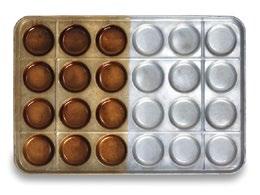
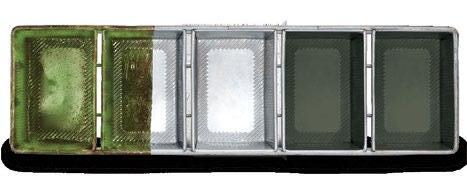
contact@americanpan.com | americanpancom For more than 30 years, American Pan has led the way in baking tin and tray innovation; from energy-saving designs to industry-leading coatings. We don’t believe in “one size fits all.” By engineering trays, applying exclusive coatings and providing economic refurbishment programs to fit your exact product and facility needs, we help you save money, increase quality, and outpace the competition. Bundy Baking Solutions: American Pan | Chicago Metallic | DuraShield | Pan Glo | RTB | Shaffer SKELMERSDALE, UK | +44 (0) 1695 50500 IRLAM, UK | +44 (0) 161 504 0771 THE PERFECT PAN from the first bake to the last. Contact our sales team to get started on your custom pan or cleaning program today. BARCELONA, SPAIN | +34 93 781 46 00 ALEXANDRIA, ROMANIA | +40 247 306170
Corona and its impacts
Everything that is currently doing the rounds about estimates of the coronavirus pandemic’s impacts is still derived from past global crises, and is not very specific or relates only to individual sectors. baking+biscuit asked around and heard assessments of the crisis by suppliers to the industry, and how they are responding to it.

+S ignals from the baking sector differ as much as the structure of the businesses themselves. News reports day after day carried photos showing empty bread shelves. While trade suppliers activated all their spare production ca pacities, the situation among artisans, catering and chain stores looked quite different.
By using to-go concepts and deliveries, companies with a large proportion of catering were forced to attempt almost overnight to prevent the turnover collapse becoming life-threatening. Moreover, all the artisans suffered from consumers reducing their shopping trips and visiting as few businesses as possible, which tended to favor the food retail and prepacked goods on bread shelves.
“Please maintain social distancing” is the order of the day in shops. All those that have them use drive-in counters. In double-quick time, others open a pop-up drive-in at a former filling station. Opportunities to cushion losses are also available on the web. It’s the age of online stores and delivery services.
HOW BAKERY MACHINE CONSTRUCTORS ARE DEALING WITH THE CRISIS
acquisitions will certainly be delayed as a result. We have reconciled ourselves to a difficult period of at least six months, but we assume we can withstand a period of this kind without any crisis-related lay-offs.
Are there any impacts on supplies and installations?
We have put all outstanding deliveries, installations and service/maintenance contract fulfillments on hold until further notice. Third-party companies’ service technicians are allowed into production facilities only in an emergency (breakdown service) - and subject to very strict guidelines. As we already said, we have plants that were ordered in storage in our warehouse, fully assembled, and are in a position to install them promptly when called for by our customers.
How are coronavirus measures affecting service?
We guarantee the customary reliable service (24 hours / 7 days/ week) even in the current difficult situation. In conjunction with a modem for remote diagnostics, we still guarantee a maximum two-hour response time.
What is the current situation for your raw materials supplies?
The supply of raw materials (in our case, components for final plant completion) also has long-term security, perhaps to some extent with slight delays.
Have you announced short-time working/have you needed to lay off staff?
How is the coronavirus crisis affecting your company?
Currently, not yet so dramatically. We had a fantastic inflow of orders in the three months before the crisis, but were no longer able to execute deliveries planned for February to April, and these plants are standing in the warehouse ready for dispatch. So we have enough to do as soon as restrictions are eased and our customers accept external companies into their premises again. We were also no longer able to carry out a whole series of trial installations (mobile vacuum plants accompanied by our applications specialists to demonstrate the financial and product-specific operating benefits in the potential customer’s business). These test operations are the precursor to the conclusion of a successful sale, and future
Like all other businesses, we immediately set up a cost management strategy to secure the company’s future. Registering short-time working is also a component of this measure. Our principal aim is not only to safeguard the company’s liquidity, but also and most particularly the active retention of our employees, since that is the only way we can continue to offer our clients the customary high standard of quality after the crisis has been overcome.
Do you have special offers for your customers in view of the coronavirus crisis?
We are convinced that a high degree of solidarity is necessary, especially in crisis situations. Since solidarity strengthens us all,
www.bakingbiscuit.com 03/2020 CRISIS MANAGEMENT 10
©
–stock.adobe.com
Aldeca Productions
we are making our contribution in the form of a 20% discount on all service work and existing service/maintenance contracts, with immediate effect and until 31.12.2020.
What are your plans for the period after coronavirus?
We are contacting our existing and potential customers to find a suitable time to resume discussions that were interrupted, to gradually work through all trial installations that were booked and are still outstanding and, together with our customers, to develop strategies regarding how costs that have arisen due to the coronavirus crisis can be earned back and thus compensated by the targeted use of Cetravac’s vacuum conditioning and the considerable wage, process & energy cost savings and state subsidies associated with it. Then, preparations for the Südback trade fair, which hopefully will still take place and at which we want to present some pioneering new developments, are also coming to the fore again. Unfortunately, we had to cancel our workshop planned for mid-May, which had aroused an unexpectedly high level of interest. However, we will attempt to fix a substitute date in the fall or in the spring of 2021.

How is the coronavirus crisis affecting your company?
Meaningful forecasts are currently almost impossible due to the dynamic nature of developments. Like any manufacturing company in Germany, we also notice uncertainty among our customers and employees. We take very seriously our responsibility as one of the baking industry’s most important partners. Since we have depended on “Made in Germany” for more than 135 years, we are largely independent here. However, even we are beginning to notice transport options and rising delivery costs. Happily, we can continue
The situation at Harry-Brot
For several weeks, Harry-Brot in Germany has recorded a large demand for bread in self-service packs. The company says it responded to this with all available baking capacities, including special shifts. Harry-Brot is now again delivering the entire range of toast-bread, sandwich bread, wholegrain and mixed breads. It says “bake-off” is the only range in which the sustained high demand can still only be met by omitting a few articles. In contrast, the company notes a marked downturn for self-service sales of bread and frozen bread rolls in baking stations.
our day-to-day operations in the production area almost without restriction.
Because we and our high-quality mixers and systems for baked products serve a market representing one of the most important staple foods, we even see a rise in industrially manufactured and packed products in this crisis. Our task now is to ensure that we also do everything in our power to ensure this demand is met. Whether we succeed in doing that in the short and medium term depends on many factors.
Are there any impacts on supplies and installations?
Our customers can depend on us 100% here, because the organization of our in-house workshops is optimum. Orders already confirmed will, of course, also be processed and delivered. We will inform our customers promptly if delays due to illness or suppliers occur here. Reliable processes to keep the level of information up to date have been developed for this purpose. Insofar as these production chains function, we will also be able to deliver on time in the future as well. Of course, limitations arise due to restrictions on the freedom to travel. This affects mainly our experts who work at customers’ premises, i.e. sales staff, technical installers, technologists, programmers and commissioning staff. However, the DIOSNA Group has a large network of competent sales/marketing and service staff that allows us to access the respective specialist personnel on the spot, and to offer a well-structured customer service organization.
How are coronavirus measures affecting service?
The fact that we constantly optimize our processes, and already have “remote monitoring” access to many of our modern production plants, has proved useful in the current situation. Some of our service technicians use videoconferencing to provide fast, uncomplicated support. Furthermore, we also have a global network of selected partners who also provide
the company. Employee health and risk minimization always have top priority in this respect. Staff returning from vacation, for example, stay away from the company for 14 days if they come back from risk areas. Our definition extends even further than the one issued by the Robert Koch Institute.
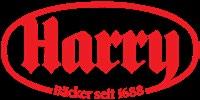
Harry-Brot gives a further report on the situation: “Since the coronavirus topic first emerged, a Harry strategy team at the highest level has assessed the current position on a daily basis, and has initiated appropriate measures for
Departure times of fresh delivery rounds and thus the simultaneous presence of employees were also separated. For office staff, systematic home office working enabled individual offices for employees present on site. Disinfection stations were installed everywhere. Hygiene standards in the production facility have always been strict and high, so there is no infection risk during a shift. Precautions to minimize contact were taken for all rest areas.” +++
11 CRISIS MANAGEMENT www.bakingbiscuit.com 03/2020
local support to our customers insofar as possible and permissible. The different versions of our maintenance kits are especially popular. For example, they give customers the option to arrange for replacement wearing parts to be exchanged by their company’s own technicians.
What is the current situation for your raw materials supplies?
We have sourced our raw materials up to now. However, even we are beginning to notice transport options and rising delivery costs.
Have you announced short-time working/have you needed to lay off staff?
No.

Do you have special offers for your customers in view of the coronavirus crisis?
We utilize digitalization as an opportunity to develop new pathways. You can look forward to all the things we have in store for you.
Discussions with our customers and business partners take place online. This also includes the remote access mentioned above. It’s how we continue to assist our customers with active help and practical advice, and support them with our process know-how and as dough experts. Maintenance kits help our customers at their site. Moreover, we continue to offer more advice through our technologists, because sourdough can be prepared by using starter cultures such as our DIOStart. This in turn increases the shelf life and freshness of bakery products, and enables an increased input of water and a reduction in raw materials usage (e.g. sugar and fat). This can be hugely financially beneficial to our customers. In addition, our teams do further research into the means by which we can support our customers. For example, we currently provide information via online platforms such as LinkedIn about the fact that DIOSNA customers who own a wheat fermenter (W Series) can produce hand disinfection agents according to the WHO recipe.
The situation at Aryzta
The Irish-Swiss baking group Aryzta is putting a brake on costs due to the Covid-19 crisis. As the Group reports, eight production sites were temporarily closed in the past week, three of them in Europa and five in North America. The Group also reports possible temporary closures of other production lines in bakery facilities to “actively reduce capacity in line with demand”. About 30% of the staff are said to have been furloughed. It also says management salaries will be reduced by 30% for the coming three months, and government support measures are being utilized.
What are your plans for the period after coronavirus?
We will continue to give our customers high quality support in the usual way. The current global crisis is actually bringing us digitally a long way forward. The task in the future will be to utilize this opportunity and to develop it further for ourselves and for our customers.

How is the coronavirus crisis affecting your company?
In the first place, of course the coronavirus crisis is affecting our internal organization, i.e. we must protect our employees in the best possible way, which is why we have adopted a whole series of measures: mobile working, increased safety distancing, videoconferences instead of face-to-face meetings, and new models of working may be mentioned as just a few examples.
As far as the market is concerned, we currently see a further trend towards large plants. “One-stop shopping” in big supermarket chains is also spurring on the need for large industrial plants. On the other hand, unfortunately, smaller businesses are facing a very tough battle with the current situation, because they often rely on individual sales outlets such as cafés or street vendors, which are closed due to the current pandemic.
Are there any impacts on supplies and installations?
We are currently still in the fortunate position in which we can say that our business processes and supply chains still function very well. Internally, we are very well positioned as a result of organizational adjustments. Externally, i.e. in relation to supplies of materials, we currently also have no difficulties and continue to be supplied properly and with the appropriate numbers of items, which is why up to now we see no significant impacts here either. Thus at the present time there is no danger to any customer projects, and we continue to make deliveries. That can change at any time, however, which is why we are currently very vigilant in this respect. We also take into consideration the risk countries according to the RKI (Robert Koch Institute).

A spokesperson told Backspiegel’s editorial office that the three European factories mentioned above do not include any German ARYZTA production facilities. As the ARYZTA Bakeries Deutschland GmbH spokesperson also reported: “We responded to changed demand by rearranging production, reducing production volumes and developing new products to match the changed requirements. In agreement with the Works Council, we also introduced short-time working in a few areas to preserve all jobs in ARYZTA Germany as far as possible. To some extent this definitely affects whole production lines.” +++
www.bakingbiscuit.com 03/2020 CRISIS MANAGEMENT 12






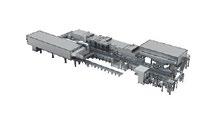
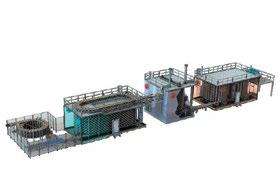
How are coronavirus measures affecting service?
Here again, there are no significant limitations. We rely mainly on remote services in risk regions according to the RKI. In this context, for example, we use an augmented reality headset to give the best possible support to customers at the plant on site. Initial deployments were already highly successful. Via local subsidiary companies, we also still have the MULTIVAC service network on the spot, which has already undertaken FRITSCH’s service activities since 1.1.2020. Thus it allows us to provide very good service to our customers even despite the current challenging situation.

What is the current situation for your raw materials supplies?
Currently, there are no restrictions here either. Moreover, as a food machinery manufacture, the BMEL (German Federal Food & Agriculture Ministry) classifies us as system-critical, and our suppliers know that and accordingly give us very good support.
Have you announced short-time working/have you needed to lay off staff?
No, quite the contrary. As already stated, we currently see a high demand for industrial bakery machinery, and are a long way from short-time working at present.
Do you have special offers for your customers in view of the coronavirus crisis?
As already mentioned, the coronavirus crisis is having a big impact on small and medium-sized bakers at present. To support them, we created the #saveourbakers campaign on our social media channels. The campaign aims to draw attention to the situation of small and medium-sized bakers, and to show that the favorite local baker is also there for his customers even during this crisis. Bakers are also developing really fantastic initiatives for this, about which we will gladly report in the context of the campaign.
What are your plans for the period after coronavirus?
Corona “compelled” us to use new ways to collaborate. Wherever this functions, we will also enable it in the future as well. It has become apparent that it is not always necessary to come together at a single point to achieve very good results. For example, our company will continue to offer machine acceptances in the factory by video, and will also focus further on remote services. We are currently able to extensively test and optimize the latter.
production operations are continuing, while maintaining safety precautions. We have also arranged a large number of home office workplaces to give our employees the best possible protection.
At this point, we owe a big thank you to our employees, who are supporting us with great optimism and understanding in maintaining the operation of the business.
Are there any impacts on supplies and installations?
At the present time, taking additional legal and safety aspects into account, carrying out installations is possible to only a limited extent. We are experiencing very open, understanding communication with customers here, because of course bakeries also give top priority to employee health.
How are coronavirus measures affecting service?
Our global 24/7 service hotline and our service team are available as usual. Spare parts can be ordered and supplied/ delivered as before. Service deployments will be undertaken to only a limited extent for the time being. We are, therefore, doing our best to support our customers by using remote maintenance.
What is the current situation for your raw materials supplies?
As a production operation, security of supply is one of our very important aspects. Our raw material supply remains guaranteed due to our widespread network of suppliers and our purchasing department’s long-term planning.
Have you announced short-time working/have you needed to lay off staff?
In times of uncertainty, it is very important that we stress we have not laid off any employees. By using the “Corona Shorttime Working” model, the Austrian federal government has found a way to temporarily reduce normal working hours and thus reduce companies’ labor costs. After exhaustive evaluation, we have also adopted this option. Our aim in using it is to retain all employees as far as possible.
Do you have special offers for your customers in view of the coronavirus crisis?
Our offer consists of continuing to support our customers by all the means available to us, to ensure the security of their production operation. This support consists of the supply/ delivery of spare parts, our global service hotline, and the provision of advice by telephone and/or via remote service. In these challenging times, we should like to thank all the bakeries that are maintaining the supply chain and are providing people throughout the world with one of the most important foods - BREAD.
How is the coronavirus crisis affecting your company?
Because our status as a production operation means we make an essential contribution to maintaining supply chains, certain areas of our business remain unaffected by possible curfews and travel restrictions for the time being. Thus our
What are your plans for the period after coronavirus?
We observed a very positive development and willingness to invest in the bakery sector at the start of this year. We hope this trend will be continued in the time “after coronavirus”. The Südback trade fair in October will be an
www.bakingbiscuit.com 03/2020 CRISIS MANAGEMENT 14
important indicator of this. We look forward to this trade fair with optimism, and are currently planning trade fair innovations. Our main focus in this respect is on the topics of hygiene and efficiency, to ensure our plants can be cleaned even better and quicker, thus giving customers maximum plant availability.
How is the coronavirus crisis affecting your company?
The Netherlands government has communicated general measures to the population and to companies. We must all take responsibility and act accordingly. We do not want to run the risk that Rademaker employees will become infected with the Covid-19 coronavirus and bring it back home as a result of travel and international field service deployments. However, Rademaker remains fully functional across all disciplines, which involves staff working under the recommended conditions, e.g. the rules for social distancing and meeting, either from home or in the headquarters. Here, we also benefit from the expansion of administration and production areas carried out in 2019, which allows more freedom of movement. We are now using modern telecommunications systems to a greater extent than previously for both internal and external discussions. For local activities, the use of our own sales/marketing subsidiaries and the international representatives network makes us less dependent on travel out of the Netherlands.
Are there any impacts on supplies and installations?
It may be impossible to adhere to stated and planned transport, installation and commissioning dates/times as a consequence of the great diversity of measures against the Covid-19 coronavirus among our customers in various countries worldwide. There are various different kinds of influencing factors, and for this reason we cannot assess the extent to which the consequences will have an impact. For this reason, we
must keep legally open any possible delivery time postponements caused by countermeasures against the coronavirus. We have already communicated this very openly to our customers.
How are coronavirus measures affecting service?
Rademaker’s 24/7 service department still remains available to customers round the clock. In most cases, help can be supplied via telephone, E-mail, online access or shipment of replacement parts. The Rademaker Academy can give good support, e.g. with quick-guide instructions, for which the new media with visualization and remote guidance also play a big role. In the most urgent emergencies, Rademaker can respond by using local service technicians without breaching
CUT YOUR CAKES WITH ULTRASONIC AT THE HIGHEST
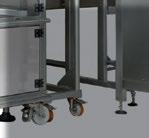


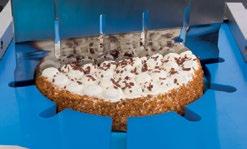












15 CRISIS MANAGEMENT www.bakingbiscuit.com 03/2020
BAKON HAS A WIDE RANGE OF LABOR-SAVING, INDUSTRIAL CUTTING MACHINES FOR EVERY APPLICATION, WITH THE BENEFITS OF: - high output - low level of maintenance - the titanium cutting blades - a cleaning unit with UV-C light for complete disinfection - our RedCase® Service & Support program VIEW ALL OUR CUTTING SOLUTIONS ON BAKON.COM SCAN THE CODE ADVERTISEMENT
travel restrictions. The robust construction of the plants and high plant availability are worth a lot at times such as the present.
What is the current situation for your raw materials supplies?
Due to Rademaker’s professional internal logistics and stockholding, together with its very high vertical in-house manufacturing integration compared to many other suppliers in the bakery machine construction industry, we have so far been able to fully supply and support production processes. From the current viewpoint, no materials bottlenecks are to be expected, and we therefore do not see any danger to the planned readiness for ex-works deliveries. Rademaker can continue to work almost independently of suppliers.
Have you announced short-time working/have you needed to lay off staff?
The answer is a very clear No. Fortunately, we had no need to adopt these measures. Rademaker is currently investing quite specifically in the research & development area for our product portfolio. This department is in full operation.
Do you have special offers for your customers in view of the coronavirus crisis?
Not in a general sense. We talk to our customers to specifically implement the optimum support for them in a targeted way. We have great respect for our customers’ power to manage the organization of current tasks. Rademaker is available to its customers in a wide variety of ways to enable continued successful working. Remote service support takes place without


How is the coronavirus crisis affecting your company?
The coronavirus crisis has also had its effects on the international RONDO group. The health of our employees, customers and suppliers has top priority. That’s why we have implemented the respective national rules and regulations for the maintenance of distancing and for hygiene. We have changed over to home office working and videoconferencing insofar as this is possible. We ask customers and potential customers to contact us by telephone or E-mail, and our contact data have been uploaded to www.rondo-online.com.
Are there any impacts on supplies and installations?
Production is continuing in the usual way, both in our main factory in Burgdorf/Switzerland and in our production site in Schio/Italy. RONDO has a large vertical manufacturing range, and fabricates most of its components itself. Therefore we can continue production even in the current circumstances. Global travel restrictions are also impeding our service staff. Up to now, we have always been able to find a solution by coordinating with our customers.
How are coronavirus measures affecting service?
We have increased the number of staff operating our service hotline, and we offer customers comprehensive support via electronic channels. Many problems can be solved by using small videos or via remote maintenance. In Germany, our service technicians are currently also travelling to customers, if the latter agree to the deployment. RONDO has service technicians at its disposal in many countries, so service visits continue to be possible as long as there is no need to cross national borders.
What is the current situation for your raw materials supplies?
RONDO has a very large vertical range of manufacture, and produces the great majority of the components for its machines and plants in its factories in Burgdorf/Schweiz and in Wasselonne/France. This is why we are not affected to such an extent that supply chains have failed due to the coronavirus crisis. At the moment, therefore, we have full delivery capability.
Have you announced short-time working/have you needed to lay off staff?
RONDO has not laid off any employees up to now, nor have we registered short-time working. Our factories in Switzerland and France are producing the usual volumes. The authorities have classified our factory in Italy as being system-relevant, and it is continuing production while observing the national regulations.
Do you have special offers for your customers in view of the coronavirus crisis?
We are currently offering our Compas 4.0 electronic roll-out machine at a particularly attractive price. With its simple operation and intelligent assistance systems, it keeps bakers’ heads free for important matters.
What are your plans for the period after coronavirus?
Many bakeries are suffering due to the collapse of out-ofhouse and on-the-go business. We very much hope that the situation will soon improve, and that the restrictions on commercial life will soon be largely removed again. In that case, the economic position will quickly recover again. +++
www.bakingbiscuit.com 03/2020 CRISIS MANAGEMENT 16
© Aldeca Productions –stock.adobe.com

MIXING SOLUTIONS for
billing, and project and marketing activities proceed via the available media without interruption to process orders and to drive forward new projects.
What are your plans for the period after coronavirus?
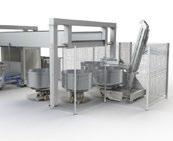
We are currently working on several scenarios and options. Here again, country-specific measures and guidelines from individual governments will have their effect in the long run. However, the experiences gained by specialized companies in the baking and foodstuff sector in this extraordinary situation, and what this can mean for the future, will be of the greatest importance. This will ultimately be expedient for Rademaker, and will determine which measures are necessary. At any rate, Rademaker’s product development department is very active, and has much in store for us.
How is the corona crisis affecting your business?
To date, our activity is of course slowed down by logistical aspects, but our plant remains operational. Once having implemented the required hygiene and distancing rules very early, a majority of our technicians are on site. All employees who have this possibility are working from home and are connected daily by videoconference (administration, sales services, design offices, etc.).
We operate in the food and health sectors, which are very much in demand to meet the basic needs of consumers. So even if the restaurants and hotels no longer order, our customers are rather very active and our activity is not stopped, far from it. Today, it is essentially slowed down by logistical aspects and travel made difficult or even impossible in some cases.
Are there any effects on deliveries and installations?
We depends on transport indeed, so this implies longer border crossings, but again we are not at a standstill. Our installations continue in compliance with sanitary rules, from VMI to our customers. The lack of carpooling, temperature measurements, personal equipment, disinfection of surfaces necessarily takes more time than normal, but we remain 100% operational.
How do Corona measures affect service?
Our service also remains active and operational. Resources are now dedicated to providing all the technical assistance our customers need, since we are less in demand on other services, such as site audits, preventive maintenance or face-to-face training. Our teams in contact with customers are teleworking and can even intervene remotely on the equipment set up for this. We are also organized to be able to ship spare parts every day. Our reception, our store and our shipments are also in normal working order.
How is your supply of raw materials currently?
After having experienced a slowdown at the announcement of the first containment measures, we now have a large majority of
our suppliers who have resumed their activity. So we have no problem with the supply of raw materials, but only downturns in the supply chain.
Did you register short-time work/did you have to fire employees?
We know our luck to support industries operating in economic sectors that are much less affected than others. Our role is to adapt to the current slowdown affecting all the countries, to be ready for the rebound of post-containment, while facing the coming recession, even if it would affect the sectors in which we operate less. VMI has not dismissed personnel. In this period when operations are slowing down, we have asked our employees not to keep the days off they could have left when the tasks assigned to them are insufficient, this is already the first measure to take into account consistency with the context.
Do you have special offers for your customers facing the corona crisis?
Our standard design equipment is the easiest to ship, since we started manufacturing a few weeks ago. We are already in demand by our customers for our singletool or double-tool kneaders, with fixed or removable bowl, and for kneading systems with bowl and forklift to meet current demand in bakeries. We can easily offer this type of equipment as part of special offers with very short deadlines.
What are you planning for the post-Corona period?
It would be very risky today to speculate on the duration of the crisis, its scale or the concrete impact on our activities. But we are certain that we will have to reinvent ourselves and face times that will certainly be difficult, while driving flexibility and mobility for our customers. Beyond the crisis itself, we are seeing underlying trends which will certainly be strengthened. Hygiene measures, control of production methods and the absence of crosscontamination will certainly be reinforced in environments where we will again have to face threats of a virological or bacterial order. Our expertise in mixing process solutions for pharmaceuticals and cosmetics, sometimes in confined and / or sterile environments, is undeniably an asset. From materials, to certifications and quality controls, to washing and sterilization technologies in place: we are armed to fully respond to this trend which is likely to develop in bakeries where we already bring cleaning systems, very effective and nevertheless economical to avoid cross-pollution.
The traceability of production and the origin of ingredients will also remain a major concern for our customers, and will even be reinforced. Our management and supervision solutions, data feedback for process improvement and production traceability are operational. Associated with our sister companies of Linxis Group, we are able to meet broader and turnkey needs for line supervision and global traceability.
CRISIS MANAGEMENT 18
+++
A company of
www.bakingbiscuit.com 03/2020
bread, pastries, cakes and snacking industries

Through innovative, precision engineering informed by our master bakers’ expertise, AMF designs integrated production solutions for a variety of baked goods, from bread and buns to pizza, cakes, pastries, and beyond. Our team of dough process experts works alongside yours to determine the most optimal makeup solution for today with the flexibility needed for future growth.

MIXING | MAKEUP | BAKING | PACKAGING | POST-PACKAGING DIVIDING | SHEETING | LAMINATING | DEPOSITING | DECORATING
AMFBAKERY.COM | sales@amfbakery.com USA | Netherlands | UK | China | Singapore | Canada | Mexico | UAE
Looking at the details is worthwhile
Consumers attach great importance to flawless products. Flours are important raw materials that must conform exactly to specifications in this respect. Rotary screen machines with stainless steel sieves ensure safety in the production process, as confirmed by several tests.

R
aw materials handling in the baking industry is highly diverse and consists of many individual steps from incoming raw materials and warehousing to processing and p acking. However, whereas planners and business economists take an overall view of the process, it’s often the details that d ecide success. If just one component operates sub-optimally, e.g. too slowly or not sufficiently accurately, or if its hygiene is not entirely faultless, the entire concept starts to falter.
Sieving machines, for example, are under scrutiny in several respects in this connection. They not only ensure that the product is hygienically faultless, e.g. by removing stones or insects, but are also responsible for the correct particle size distribution in flours. This in turn plays a decisive part in subsequent processing and for the quality of the end product.
Various different types of sieve are used in the baking industry. For example, vibration sieves with horizontal screen decks are typical. Normally, each screen deck is mounted in a circular frame and also has a series of screen cleaners such as rubber or plastic balls or cubes. These cleaners strike against the underside of the deck while the sieve is in operation, to prevent the deck being blinded. A drive mechanism ensures a short linear backward and forward movement, while simultaneously moving each sieve vertically.
Another method is the rotary sieve, consisting of a stack of several square screen decks. A drive mechanism transmits a circular movement to the sieve decks in a horizontal plane. The horizontal sieve screen and the absence of vertical movement create a gentle sieving movement. This maintains the natural layering of the material, with fine particles

against the screen and coarse particles at the upper surface of the material bed.
Rotary sieves have a built-in screw conveyor that feeds the product into the sieve through an inlet housing. For this purpose, a drive motor mounted on the flange drives the feeder screw and perforated screen drum and the sieving mechanism. The screw then conveys the product to the pre-sieving drum and to the screening unit, where rotating paddles in the chamber accelerate its movement and swirl the product through the sieve. This high speed moves the particles to the deck surface several times, thus increasing the probability that all the particles really will pass through the sieve.
High capacity and long lifetime
Zeppelin Systems rotary screening machines (e.g. the RS 3 or RS 7) have proved successful for many years to process powdered bulk goods in the food industry. They are used as a secondary screen downstream of silos, below filling points and containers, and as inline sieving machines for pressuretight operation from -0.4 bar (gauge) to +0.8 bar (gauge) in pneumatic conveyor lines and unpressurised directly under containers. There is a large selection of screen basket variants, in different construction materials and with different mesh and gap widths and perforation diameters.
In general, rotary screening machines have a compact, robust, low-vibration construction, specially designed for high capacity and long lifetime. The feed screw and striking mechanism,
www.bakingbiscuit.com 03/2020 RAW MATERIALS HANDLING 20
+
© Zeppelin
for example, have double bearings. Automatic screen basket clean-out is another option.
In the RS 7 rotary screening machine, for example, coarse pieces of product that could damage the sieve are separated from the product stream beforehand by a pre-screen basket with a 10 mm mesh width, and are carried to the coarse material outlet. The coarse material outlet is closed with a leak-tight coarse material bag or alternatively sealed by a pneumatic isolation flap valve. Emptying the coarse material cylinder on sealed pressurized machines can take place during conveying. The sieved bulk material is passed through the fine material collection cone for further use.
Many aspects of safety
The rear cover, on which the seal and shaft bearing are mounted, can be dismantled to change the screen or make a general visual inspection of the sieve drum. A safety end switch ensures that the machine cannot be switched on when the rear cover is removed. On the larger RS7 sieve machine, inspection of the sieve drum can also take place through the inspection opening at the side, which is also secured.
All components in contact with the product are of food grade quality and are designed based on BG (trade association) regulations and following the EHEDG (European Hygienic
Engineering and Design Group) guidelines, and are accordingly easy to clean. The design of the screen basket also contributes to this. It is easy to inspect by using the inspection openings at the side of the sieving machine, and to clean and if necessary to replace. Of course, the rotary sieving machine is also available in a model complying with the ATEX (Explosive Atmospheres) Directive 94/9/EG for use in Zone 21 or 22.
The screen basked can be fabricated from polyester or 1.4306 stainless steel. A slotted screen basket is recommended as a particularly robust variant.
What to do if a sieve breaks?
Every polymer screen breaks in the course of time. To detect such a screen break, these sieving machines can be fitted with an optional automatic screen basket monitor (Screen-D-Tect). This continuously monitors the state of the special screen cloth in ongoing operation. It operates by constantly measuring the electrical resistance, which abruptly changes when there is a screen break. This minimizes production downtime, and product can be isolated immediately before the raw material is processed. It also guarantees that previously produced product is still OK. When using a daily visual inspection, at least a whole day’s batch would have to be discarded. This method functions very well for a large number of applications.
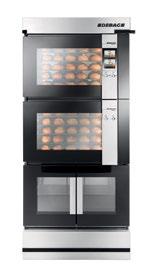

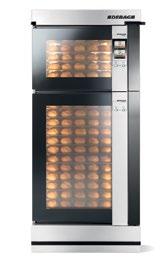
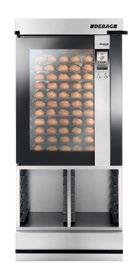



21 RAW MATERIALS HANDLING
ADVERTISEMENT
DECON: In-store baking & cooking www.debag.com DECON 12/5 DECON 5/5 Maximum flexibility due to modular design debag.com
DECON 12
Made in Germany
On the other hand, a disadvantage when using normal polyester cloth is that it cannot be detected by the usual means. Stainless steel slotted screen baskets provide entirely different opportunities. The big advantage: stainless steel can be detected. This provides a greater safety factor if a screen breakage occurs and very tiny materials get into the sieved material. It would then be possible to identify these batches easily and reject them at an early stage. Therefore this variant is attractive mainly for companies with hygiene-sensitive products. There are usually no problems in replacing a polymer screen with a stainless screen, even with older sieving machine models.
The route to the perfect sieving machine
The studies were modeled on test methods of the American Institute of Baking (AIB) an. The Technology and Information Transfer Center for Bakers and Food Processors is composed of experts from the areas of baked goods production, experimental baking, cereals science, nutrition, food safety and hygiene. Many foodstuffs industry companies even rely exclusively on AIB-certified components. Thus it is an ideal partner when there is a need to test the suitability of components with regard to safety, quality and hygiene.
These tests dealt mainly with the central question as to whether flours can be screened just as safely using a rotary sieve machine with a stainless steel slotted screen basket as they can with polyester cloth screens. The background is that the mesh shape in polymer screens is rectangular, whereas for fabrication technology reasons the openings in a stainless steel slotted screen basket have a square shape as elongated slots. In theory, this could lead to increased penetration ability in the case of elongated foreign material.
Detailed studies
First of all, a test was carried out to discover whether the sieving machine fulfilled the AIB’s specifications in principle. These tests were passed successfully. Thus it was possible to screen flour with the recommended 30 mesh even into various different sieve equivalents.
This was followed by various investigations in which foreign material was mixed into the material being screened. The foreign material differed in nature (e.g. glass, paper, plastic, small stones or hairs), size (e.g. starting at a thickness of 1 mm) and shape (elongated, circular etc.). In another series of tests, the input material was mixed with insects (e.g. Tribolium confusum – the confused flour beetle). All the tests were carried out in the company’s own test installation at the Rödermark site on the RS7 rotary sieving machine.
It involved testing various different foreign materials and sizes. First of all, the cone was filled with 50 kg of flour and the foreign materials were added by hand. The sieving machine was then started. A further 150 kg was then added and sieved. The machine and the screen were then cleaned. The sieved flour and the flour from the inside of the screen were then sieved by hand. All the foreign materials that were found were collected and analyzed. Each experiment was repeated three times. The result was clear: 99% of the foreign objects mixed into the material to be sieved were sieved out by the rotary sieving machine.
The question as to whether a higher degree of protective screening in the case of insects/insect parts is achievable when using the RS 7 was interesting, especially with regard to the preparation of kosher and halal products. Although it would be necessary for further tests using weighed screenings to be carried out for official certification, the sieving results here were convincing.

Summary
In tests modeled on the AIB method, it was possible to confirm that high quality standards can also be satisfied when using slotted screens in a rotary sieving machine. Of the added foreign objects, 99% were reliably sieved out. Polyester screens are adequate for many applications in the foodstuffs industry. However, stainless steel screens are recommended if higher requirements are imposed, especially with regard to detectability. In practice, it is helpful that a polymer screen can be replaced by a stainless steel sieve at no great expense, even in older machines.
Author: Sven Schwelgin
++ Th e rotary screening machine is used as a preand post-sieve in various industries, under silos and upstream of containers, or in loading stations
www.bakingbiscuit.com 03/2020 RAW MATERIALS HANDLING 22
©Zeppelin
+++
Consistent Quality, Efficiency, Profitability

Customers demand the highest quality bakery products delivered on time and at the right price. Rademaker understands these challenges. We provide efficient bakery equipment for every possible production environment, based on your specific dough processes and product requirements. Resulting in the lowest cost of ownership in the market yielding maximal results in terms of product quality and return on investment.

We offer equipment for the production of:
• Dough bread / roll lines for bread rolls, Mediterranean breads and flatbreads.
• Dough strip toaster for premium quality toast and sandwich loaves.
• Laminating and processing lines for puff pastry and croissants.
• Dough roll-out lines for yeast doughs, shortcrust pastry, cake, Berliner and donuts.
• Pressing and punching machines for cakes, pies, quiches and tortelettes.
• Pizza bottom and topping machines, application specific dispensers and strewing.
 Specialists in food processing equipment
Specialists in food processing equipment
www.rademaker.com
Development and expansion
Michał Zajezierski , Vice-President of the Management Board of the Polish bakery
Nowel Sp. z o.o., spoke with Editor-in-Chief Bastian Borchfeld about the challenges facing the bakery industry and how the family-owned company intends to continue to grow.

Borchfeld: How do you assess the current economic situation?
+ Zajezierski: In recent years, the economic situation has certainly been favourable for us, and Poland, in economic terms, was in an upward trend. The standard of living of Polish families, according to the Central Statistical Office, has remained stable and the assessment was clearly positive. Optimistic moods in the society and a good economic situation (Poland's GDP increased by 3.8% last year) translate into economic growth and greater consumption – including bread. However, the constant cost increase, which we have been dealing with for several years, is a considerable challenge for manufacturing companies, especially in connection with still low prices of bread in Poland, when we compared them with neighbouring countries
+ Borchfeld: What are the biggest challenges for the baking industry, especially for NOWEL?
+ Zajezierski: The increase in production costs is certainly one of the biggest challenges for the baking industry now. It concerns energy or labour costs, as well as raw materials prices – which means for bakery products mainly flour, the price of which, according to the latest data, increased by 7% last year in Poland. However, the problem is global; although climate change affects many industries, it plays a special role in the food sector. It even creates a new reality to which all food producers must adjust.
+ Borchfeld: In 2019, you took part in various fairs.
+ Zajezierski: In 2019 we made our debut as an exhibitor at the biggest and most important event in the food industry –Anuga Food Fair. Up until then, we have been present in Cologne for many years as visitors. Earlier, in May, we had presented our products at the PLMA in Amsterdam, so we dare say that we have marked our presence at the two most
important events for the baking industry in Europe. Given our growing position in Poland and our ambitions, it is almost certain that we will attend these and other industry events in Europe and beyond on a regular basis. Currently, Nowel is present on 15 foreign markets, including non-European countries such as South Korea and the United States, and 30 percent of our products go to stores outside Poland. This percentage will grow from year to year. We focus on strengthening our position on European markets and on expanding our product offer. And from this perspective, these meetings, discussions, exchange of experience with industry representatives from almost all over Europe were invaluable. Some of the visitors knew us from previous professional exchanges, for others we were an interesting and inspiring example of a company that for almost 100 years of its activity had undergone all development levels – from a small local bakery to an international producer of frozen bakery products. I am convinced that some of the relations established during these meetings will result in cooperation and the ever stronger brand of Polish bread will win lovers among the next European consumers.
+ Borchfeld: Who buys your products?
+ Zajezierski: In short, conscious consumers who are looking for healthy products of high quality. Although Europeans, including Poles, consume less bread than they used to, their decisions concerning the choice of bakery products are more thoughtful and their expectations of quality and offer are higher. They choose natural sourdough bread, enriched with seeds or other nutritionally valuable additives. Bioproducts, manufactured on the basis of raw materials from organic farming, are also becoming more and more popular. It has become a standard among customers to pay attention to whether the bread has the so-called “clean label”, i.e. whether it contains only natural ingredients, without preservatives or
www.bakingbiscuit.com 03/2020 INTERVIEW 24
+
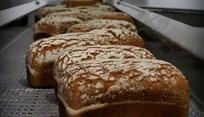
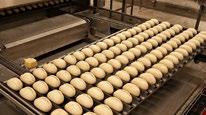
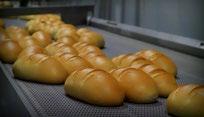

dough enhancers. We try to react to the consumers’ changing needs on an ongoing basis, so we are constantly developing our offer, while maintaining traditional production recipes. That is why, among other things, in autumn 2019 we launched one of the most modern Research and Development Centres in Poland, which will allow us to optimise production processes and introduce innovative bread of the highest quality even more effectively. The work in the Centre is carried out by our outstanding specialists, supported by scientists from prestigious Polish universities who are patrons of our activities. Another trend that we notice in our customer's choices is the interest in snacks, including hot dogs. The dynamic development of the "convenience" sector has been the most important trend from the point of view of all food producers for several years. Europeans want to have quick and comfortable access to tasty, good quality snacks wherever they are, e.g. on their way to work, to a meeting, during shopping or business trips.
+ Borchfeld: How high is the export quota?
+ Zajezierski: The export quota amounts to 30 % of our sales. This percentage has been growing steadily in recent years and we hope that this trend will continue in the future.
+ Borchfeld: In 2019, you were planning to increase your production capacity. Did you manage to achieve this plan and what is your production capacity now?
+ Zajezierski: Constant and cyclical production increase is our priority. In 2014, in Legionowo, we launched one of the most modern lines for the production of Kaiser rolls, in 2016 –a line for the production of mixed breads, and in 2017 – a fully automated line for the production of baguettes and rustic bread and Europe's largest line for country bread rolls, called rosenbrotchen. In 2019, as I have already mentioned, we launched a line for the production of breakfast rolls and of
hot dog bread. For this year, we planned new investments, which will allow us to further develop our product range.
+ Borchfeld: Can you share the information about the amounts the company invests annually in production? What are these areas?
+ Zajezierski: Since 2013, we have allocated more than 50 million EUR for the development of the machinery. Many stages of production are currently performed by robots. Modern technologies and innovative solutions are the most important areas for us; their aim is to streamline production, constantly improve the quality and nutritional properties of the produced bread. Quality is our priority, therefore the opening of the Research and Development Centre was such an important event for us. In accordance with the investment plan adopted by us, we focus on work optimisation and constant introduction of innovations. Such a strategy aims not only at offering our customers the best possible products but also at improving the processes from the point of view of employees.
+ Borchfeld: NOWEL is a family business. Should it remain so?
+ Zajezierski: The history of our company dates back to the mid-1920s. Exactly in 1925, Antoni Nowakowski founded an artisan bakery, which for many years produced bakery products for inhabitants of a village near Warsaw. With time, this small bakery turned into a family business, which is passed on from generation to generation. Currently, the fourth generation – me and my sister Karolina Zajezierska, with the support of our mother, Elżbieta Zajezierska – co-decide on the development of the bakery. We focus our attention on further development of the company in two areas – on innovations in the product range and export. The new product has always been a family business, a part of our life and definitely should remain so. We do not think about other solutions.
+ Borchfeld: If we could look to the future... What will the situation of the company look like in 5 years?
+ Zajezierski: We certainly think about increasing our presence on foreign markets, we want to send our bread to new countries, also outside Europe. Thanks to constant innovation in technology and very close partner relationships with customers and partners around the world, we can respond quickly to the needs of consumers almost all over the world. I am convinced that it is precisely this flexibility and the anticipation of trends that is our strength and a feature that is appreciated by an increasing number of our customers. We also want to build a brand that recognisable, liked and respected by the end-customer, i.e. the consumer. We want our company's DNA to be preserved along with the technological development and expansion of NOWEL's scope of activity. We believe that the bakery's dynamic business development can go hand in hand with those values to which our family has been faithful for 100 years and which successive generations of bakery employees believe in.
+ Borchfeld: Thank you for the Interview. +++
25 INTERVIEW www.bakingbiscuit.com 03/2020
© Nowel
Lye champion
Ditsch has belonged to the Swiss Valora Group since 2012, and specializes in producing lye baked goods. The company invested around EUR 40 million at the Oranienbaum location.

+Ditsch has belonged to the Swiss Valora Group since 2012, and is a lye baked goods specialist. For this, Ditsch operates around 200 sales outlets in Germany at highly frequented locations such as rail stations. With production factories in Mainz and Oranienbaum, and in Cincinnati, USA, the company is among the world’s leading suppliers of lye baked products. The very varied range of products offered includes pizza snacks and croissant specialties, in addition to the premium range of frozen lye baked goods.
In addition to producing for Ditsch sales outlets and Pretzel King shops, the company has very successfully supplied baked goods to large consumers since 1998, e.g. bakeries, hotels, restaurants, catering companies, filling stations and the food retail.
An extensive product range
In Germany, more than 700 employees currently produce over 600 million products/year in the Mainz and Oranienbaum factories. In 2017, Ditsch also expanded to Cincinnati in the
Valora Group
Around 15,000 employees are involved in the Swiss Valora Group’s network every day. Valora has more than 2,700 small-area sales outlets located at highly frequented sites in Switzerland, Germany, Austria, Luxemburg and the Netherlands. The company also owns k kiosk, Pretzel King, BackWerk, Ditsch, Press & Books, avec, Caffè Spettacolo and its own brand ok. – together with a steadily growing
USA, where approx. 30 employees make baked goods for the North American market on two production lines. The picture is rounded off with a production line in Emmenbrücke in Switzerland, where around 30 employees also produce lye baked goods.

as rail stations
product range of digital services. Thanks to Ditsch, among other things, Valora has developed into one of the leading lye baked products manufacturers worldwide, and in the baked goods area it benefits from a strongly integrated value-added chain extending from lye baked goods production to sales to intermediaries (B2B) or in the form of the operation of takeaway concepts (B2C). +++
www.bakingbiscuit.com 03/2020 PRODUCTION 26
++ Di tsch operates sales outlets at highly frequented locations such
© Ditsch
© Ditsch


Ditsch’s broadly-based product range extends from preproofed, frozen dough pieces to ready-baked, frozen products. The company is certified in accordance with IFS and BRC, and thus fulfills strictly-defined quality and safety standards. The company is also represented at national and international trade fairs such as Internorga, Südback, iba, Anuga or Sial. Ditsch exports its products to 28 countries worldwide.
Expansion at Oranienbaum
Around 230 staff work at the company’s headquarters in Mainz-Hechtsheim, where there is a production facility, an administration building, a high-bay frozen products warehouse and a dispatch building. The second location is in

Oranienbaum, where around 500 employees have produced dough pieces and other baked goods since 1999. With a floor area of around 40,000 m2, the location has been continuously enlarged. As recently as 2019, the company invested around EUR 40 million in a new building and two new production lines, designed to expand capacity by around 15% and to create a total of approx. 100 new jobs.
More than a million baked products are manufactured at the Ditsch production facility in Oranienbaum every day. To make this possible, the operation runs 24 hours/day. In this respect, works manager Matthias Hartung relies on state-ofthe-art technology and robots to produce frozen pretzels, for example. The production process demands a lot of
The new star in the baking universe




27 PRODUCTION ++ Ex terior
© f2m ADVERTISEMENT
view of the production facility in Oranienbaum/Germany ++ Pretzels are produced on the new production line
orbit An all-new rack oven designed and built by MIWE Germany ▶ Large baking area on a small footprint ▶ High-volume steam for an outstanding shine ▶ Perfect airflow for an even bake ▶ Easy to operate with modern touch-control panel ▶ Quick installation and easy maintenance ▶ Optimal energy use See it on www.miwe-orbit.com Touch it and test it in the MIWE live baking center
founded by Wilhelm Ditsch
The history of the Ditsch pretzel bakery
Inauguration of the new Ditsch factory with 7,700 m2 of production area in Oranienbaum near Dessau as a second production site
First dismantlable pretzel sales stand at Mainz main rail station
Move to within Mainz.
The new company headquarters has a 3,250 m2 production building, two separate production lines, a 750 m2 administration building, a high-bay frozen products warehouse and a dispatch building
Ditsch takes over Pretzel King AG, which was founded in Switzerland, and expands the network of Swiss sales outlets

After Ditsch had already supplied a new product range to the food retail and the cash&carry area for the first time in 2006, the sixth production line is now commissioned in Oranienbaum
The opening of the 200th Ditsch shop in Berlin is celebrated, and what is now the eighth production line is operating in the Oranienbaum works
A third production line is commissioned
100 years of the Ditsch pretzel bakery. Now with more than 200 shops and with Ditsch USA and Pretzel King Switzerland, the idea created by the founder Wilhelm Ditsch is today one of the leading manufacturers of lye products worldwide. The Oranienbaum site is enlarged by building Hall 3. Building expansion also takes place in the USA (frozen product warehouse and new production line)
The production area in Oranienbaum is enlarged to 15,000 m2, and the frozen product warehouse expanded to 6,000 pallet storage locations

know-how. The dough piece must not be too soft when being lye-dipped, and its shape must remain stable. The surfaces of the dough pieces are slightly dried out to ensure that the lye cannot penetrate too deeply, and the dough pieces must become firm before being lye-dipped. After this, the baked products are coated with a 3 – 4% soda lye solution for a few seconds and baked for 12 – 15 minutes. A lot of experience is needed to achieve the typical brown baked product color. As works manager Matthias Hartung explains: “For us, the marked contrast between the pale bloom and the chestnut-colored crust is a mark of quality.”
Round the clock
Lye bread rolls and lye sticks as well as pizzas, croissants (filled and unfilled) and molded cookies are also produced in Oranienbaum,


in addition to Ditsch pretzels. Depending on orders and customers’ requirements, the lines must be reorganized every day, and the machines adjusted and recipes adapted. This needs very precise planning to ensure the machines can be operated as efficiently as possible. Therefore, it is also important to works manager Matthias Hartung that the employees work well together. He insists on flat hierarchies. His staff also regularly undergo further training. As works manager Hartung explains: “We systematically give our employees further training, which includes internal and external training courses. On the one hand, we want to remain an attractive employer and retain our employees’ loyalty, while on the other it also allows us to offer our staff a variety of career opportunities.”
The production facility at the Oranienbaum site operates 24/7, and plant capacity occupation is high, which also explains the investment in the new building with two production lines and a high-bay frozen product warehouse. The company is delighted with a steadily increasing demand for lye baked products, and the order books are full. Ditsch wants to remain Germany’s lye champion through constant investment in new technology, as well as in staff training and further education. The company also wants to achieve further growth. +++
www.bakingbiscuit.com 03/2020 PRODUCTION 28
1919
2012 2017 1995 1993 1972 1991 1960/70
1980 2008 2014
2003
1998/99
2019
Focus on pretzels and lye baked goods
First pretzel oven to bake-off frozen dough pieces
The Ditsch pretzel bakery becomes part of the internationally operating Valora Group in Switzerland, with Peter Ditsch as anchor shareholder
The Valora Group buys the Pretzel Baron lye product manufacturer based in Cincinnati, Ohio, and is thus on the spot for the first time with its own production facility in the USA. Pretzel Baron is renamed Ditsch USA in the following year
©Ditsch
photo: © Ditsch; graphic: Landmagd
Bake Better Product and Improve Throughput
With the New SCORPION® 2 Digital Humidity Sensor
Humidity in a thermal process interacts with the product. The moisture in the environment often comes from the product itself and represents a delicate balance affecting finished product quality in many ways. Product throughput can also be affected by when and how much moisture builds in a process. Moisture laden environments reduce baking efficiency, thereby reducing product throughput.
Reading Thermal recently developed the SCORPION® 2 Digital Humidity Sensor to measure humidity in your thermal process. This breakthrough design provides a more accurate and reliable way to measure the absolute moisture content. The sensor contains a proprietary humidity sampling system with patent pending Anti-Saturation Technology™ that allows measurements in high temperature and high dew point processes.

Bread Oven with Steam Injection
The above graph displays the shape of the humidity profile, the peak moisture value obtained, and where it occurs in your oven. Profiles identify problem areas and allow you to fine tune your process for optimum results.
Why is Controlling Process Humidity Critical to Baking Success?
• The amount of moisture in a product can determine its shelf life.
• Reduced evaporation can keep the surface of a product moist, allowing it to stretch, preventing cracks.
• Low humidity in a cracker oven can cause blisters leading to undesirable dark spots and excessive breakage.
• The lack of humidity in a cookie oven can cause case hardening, which prevents internal moisture from escaping and leads to checking.
• High humidity in bread ovens produces the desirable glossy crust on many bread products. For this reason steam injection is often used.
• High humidity will assist with the killing of pathogens, like salmonella, potentially found in surface toppings.
For details, e-mail us at info@readingthermal.com or call 610-678-5890 ext. 2.

Turnkey solutions
The Verhoeven Bakery Equipment Family in the Netherlands – BVT, NEWCAP and VACUUM & BAKEPACK are parts of this Family – which offers turnkey solutions, e.g. in the lamination technology area.

+Technique and technology in the dough lamination area has developed and changed in the past 40 to 50 years. New ways were found and implemented in practice. Maarten van der Coer, Director for Marketing & Organization in the Verhoeven Bakery Equipment Family, says: “Turnkey solutions! The focus within our organization is currently on this area. We have pooled our strengths to form a single family. BVT Dough Process Solutions, NEWCAP Industrial Handling Solutions, VACUUM Cooling & Baking Company and BAKEPACK End of Line Solutions.” The companies have always been sister firms, Verhoeven being a company with experience in the machine construction field. According to Maarten van der Coer: “The market did not see us as one family, however, which is why we founded a new brand group: the Verhoeven Bakery Equipment Family.”
BVT, NEWCAP, VACUUM & BAKEPACK are all parts of this Family. BVT is a specialist in the area of dough processing lines, NEWCAP specializes in handling and conditioning, VACUUM is the vacuum cooling and baking specialist, and BAKEPACK specializes in end-of-line solutions such as packaging, robotics and palletting.
The Group offers tailor-made solutions to the baked products industry worldwide. The company operates with strategic partners for the components that it lacks, e.g. an oven.
Lamination
Marketing & Organization Director Maarten van der Coer explains that general technology in the lamination area has not changed significantly in the past ten years. Development resides in very specific components and tools to guarantee and improve the quality of laminated products. Hygiene

design has been taken to a new level in recent years, and so has the software. Hygienic Design, e.g. opportunities for easy cleaning and good accessibility, is the new standard in the bakery machines market. In the course of the years, software has been developed leading to very intelligent systems that precisely monitor end product quality. Furthermore, software systems management has become simpler, because intelligent system integrations undertake software control everywhere and at all times, in the factory or remotely. Software systems can now also communicate with higher levels of automation extending all the way to ERP systems (Enterprise Resource Planning).
BVT offers various lamination solutions with capacities ranging from 500 to 8,000 kg/hour. In this respect, there are many factors acting on end product quality, e.g. ingredients, recipes, the type of fat, fat temperature, dough resting time, the number of layers and the alignment of the dough. The environmental temperature and consistency of the
www.bakingbiscuit.com 03/2020 PRODUCTION 30
++ Th e Group offers tailor-made solutions to the worldwide baked goods industry. The company recently installed two turnkey projects with various lamination sections
© BVT © BVT
++ Ap plication of fat to a dough sheet. The company offers a great variety of solutions for this task
Verhoeven Bakery Equipment
BVT offers tailor-made production lines for all kinds of bread and baked products. BVT is part of the Netherlands-based Verhoeven Bakery Equipment Family. Four companies belong to the Verhoeven Bakery Machines Family, all with their own specialization. The Verhoeven Bakery Plants Family comprises BVT Dough Process Solutions, NEWCAP Industrial Handling Solutions, VACUUM Cooling & Baking Company and BAKEPACK End of Line Solutions. More information can be found at: www.verhoevenfamily.com +++
ingredients are also important for the final result. This is why BVT has developed various solutions to control each of these factors.
New fat pumps
BVT can offer both semi-automatic and fully automatic lamination methods. The company also offers various kinds of butter pumps, depending on customers’ requirements. A unique feature of the new design of these pumps is the exclusive use of stainless steel pump components. Rubber components have also been replaced by stainless steel, making the pumps considerably more robust. Therefore the BVT fat pump is able to create a stable fat layer from all types of fat blocks, ranging from hard fat types to fats with a low melting point or high viscosity. This is all carried out without changing the size of the fat blocks or cutting them. These butter pumps have capacities extending from 50 kg to 1,500 kg/hour.
According to company information, customers praise the good accessibility of the pumps. Servicing is easy to carry out. The fat pumps can operate fully automatically by using fat supply sensors, and as a result of their software system.
All-in processes and lamination
An all-in process involves incorporating small cubes of fat into the dough during the mixing phase. BVT has developed a special fat block cutter for this method. This cutter is able to size-reduce fat into specific sizes, and automatically feeds the modified size fat cubes into any dough mixer at the rate of up to 1,500 kg of fat per hour.

The choice of lamination technology depends on the dough consistency and nature of the product. Two methods known in the market are the overlapping method (vertical lamination) and the retraction/cut and stack method (horizontal lamination). BVT offers both methods. On request, BVT also offers a combination of the two methods. The company also offers all the common processes, as well as L-, U- and Z-shaped production lines together with the inline process. When necessary, BVT integrates a resting and/or cooling section to completely control the temperature and consistency of the laminated dough.
Turnkey projects
Maarten van der Coer: “Reaching a successful layout with turnkey projects is a challenge. In the first place, we begin with a very exact product description. In addition to the capacity required by the customer, we also take into account factors such as the number of layers, weight, size, flavor, necessary process parameters and required quality. Secondly, we state the type of machines needed to fulfill the quality and capacity requirements. Thirdly, we attempt to design a layout corresponding to the space available in the factory. If the machines won’t fit into the factory, we go back to the drawing board. Finally, we ensure the entire equipment fits, by finding creative, innovative solutions.” The group delivered two turnkey solutions only recently. The first of these involved a cake line with a capacity of 20,000 pieces per hour, from mixer to packaging. This line was equipped with two laminating machines for an upper and a lower layer of dough. The lower layer of dough is made from yeast dough with a capacity of 1,200 kg/hour. The upper layer of dough is made from laminated puff pastry with a capacity of 800 kg/hour. The plants enable the customer to produce a wide range of baked goods. They can also process various fruit fillings as well as chicken and meat fillings.
According to Maarten van der Coer: “This line was a special project, because the space in the factory wasn’t large enough for the necessary capacity. BVT carried the process to the required result by adapting the equipment to the circumstances of the building. This was achieved by setting up inline laminating sections alongside the oven.”
++ Th
e newly-developed fat pump is designed to be particularly robust, and processes a
wide variety of fat types
The second turnkey project was a “fried Danish twisted stick line” with a capacity of 2,000 kg/hour, from mixer to packing. This line contains two laminating sections. After lamination, the dough is turned and twisted. Next, the twisted dough is cut into small sticks. The sticks are positioned before being carried to the proofer. As soon as the twisted sticks emerge from the proofer, they are baked in the BVT deep fat fryer. Finally, the twisted dough sticks are coated with a glaze and packed. As Maarten van der Coer explains: “This project was rather special because the previous process operated only partially automatically. The process is now fully automated, in accordance with our customer’s wishes. In addition, a higher level of quality has been achieved.” +++
31 PRODUCTION www.bakingbiscuit.com 03/2020
© BVT
Cookie production systems
There are both automatic and manual solutions for cookie production.
Albert Handtmann Maschinenfabrik GmbH & Co. KG, Biberach/Riss,
offers various processes.

+Albert Handtmann Maschinenfabrik GmbH & Co. KG, Biberach/Riss, Germany, develops and builds system solutions to manufacture baked goods and confectionery with the core functions divide, mold and meter the dough. Product areas include bread, baked goods, bread rolls, snacks, trend products and more. There are both automatic and manual solutions for cookie production.
Dividing/extruding
Handtmann FS 510 or FS 520 molding machines in conjunction with a VF 800 portioning machine enable automatic, multi-row dough division/extrusion and molding. The company reports that the molding tubes have a quick-change
capability, allowing a wide range of variants through fast product change times. It also says the use of a driven filling flow divider guarantees very accurate weights per row and piece. Examples of products include biscuits and cookies of various types, e.g. gluten-free or with chunky ingredients such as nuts or chocolate. The FS 510 molding system can be used to produce on up to 24 rows simultaneously. Product batter is fed from a VF 800 portioner machine to the 6 to 24-row filling flow divider integrated into the FS 510. The servo-driven filling flow divider guarantees a continuous filling flow on all the rows. Separation takes place without interruption, directly at the product outlet and linearly relative to product speed. The required product shape is produced by format tools. The company says production is possible on trays, grids or a conveyor belt. Cookies with a 20-g portion size and a product diameter of 435 mm and product height of 15 mm are one example of production. Portioning directly onto the belt achieves 10,800 pieces per hour or 216 kg/hour.
Cutting unit
The MSE 441 manual cutting unit used in conjunction with a VF 800 or VF 600 B portioning machine is suitable for producing cookies of a wide variety of types. With this solution, product batter from the portioning machine is pre-portioned and passed to the manual MSE 441 cutting device. A format insert carries out the shaping. Depending on the product batter, cutting is optionally via a manually-operated knife or a wire cutter. The knife is handled in a simple “flip-flop mode”.

PRODUCTION 32
www.bakingbiscuit.com 03/2020 KOENIG BACKMITTELGMBH & CO. KG • Postfach 1453 • D-59444 Werl Tel. 02922/9753-0 • Fax 02922/9753-99 E-Mail: info@koenig-backmittel.de • Internet: www.koenig-backmittel.de
and freshness with long tradition
Hazelnut- and Peanut-Products, roasted, sliced, diced and slivered. Hazelnutfilling and Multi-Crunch. Please ask for products meeting your specifications. KOENIG Motiv4 NTS 91x53.qxd 12.02.2007 11:10 Uhr Seite 1 ADVERTISEMENT
++ Us ing an FS 510 molding system for automatic cookie production
© Handtmann
The Nut specialists Quality-brand
Almond-

++ Th e quick-change procedure for molding tubes allows a large number of variants

++
Molding component changeover is possible by simple plugand-play without using any tools. Standard format inserts are available in diameters of 30/40/50/60/70/80 mm. An example of use is the production of cookies with a 20-g portion size, a portion height of 15 mm and a portion diameter of 45 mm. Two operators and a VF 608 B with a MSE 441 are able to achieve a capacity of up to 2,500 pieces per hour, equivalent to 50 kg/hr.

Dictionary








© Nicole Lienemann –stock adobe.com PRODUCTION
+++
© Handtmann
© Handtmann ADVERTISEMENT Dictionary of Bakery Engineering and Technology
of Bakery Engineering and Technology Wörterbuch der Bäckereitechnik und -technologie
termes techniques et
boulangerie
de ingeniería y tecnología
de panadería y bollería Словарь по хлебопекарной технике и технологии Ordbog for bageriteknik og -teknologi English German French Spanish Russian Danish Japanese f2m food multimedia gmbh Ehrenbergstrasse 33 22767 Hamburg Germany Publishing house · baking+biscuit international · brot+backwaren (German) · chleb+wipetschka (Russian) DEU ENG FRA SPA RUS DAN JPN
An MSE 441 manual cutting unit on a VF 608 B portioning machine for cookie production
Dictionary
Dictionnaire des
technologiques pour la
Diccionario
para el sector
of
and Technology
Hard copy, 336 pages, EUR 39 + handling/postage One industry –one dictionary f2m food multimedia gmbh usanova@foodmultimedia.de Phone +49(0)40 39 90 30 62 Fax +49(0)40 39 90 12 29 Or use the QR Code:
Bakery Engineering
www.foodmultimedia.de
SALTEK – Synonymous with Pita Bread Lines
SALTEK is an international leader in the production of Pita Bread Automatic Production Lines. Saltek’s facility is located in the industrial zone of Mazraat Yachouh/ Metn in Lebanon and extends over an area of 15,000 sqm with further expansion planned to cover an additional 4,000 sqm.

Baking and Biscuit International recently met up with Saltek’s CEO Garo Salkhanian.
+ Borchfeld: Mr. Salkhanian, you have worked in the baking industry for many years. What major changes have you seen?
+ Salkhanian: Saltek was founded in 1977, at a time when pita bread baking was still carried out in traditional ways. We were keen to incorporate technical innova tions alongside the requirements of modern industry and we succeeded in combining tradition and the experiences of the past with the technological progress of today. This has enabled us to offer clients the best of modern equipment for the production of excellent pita bread. Of course, in order to achieve our goal, we have worked hard and listened carefully to our consumers‘ needs. Saltek is also continually setting new standards and has acquired CE and UL certifications, the first company in the industry to do so, which means we can now cater to the requirements of the European and North American markets in terms of safety, operations and electrical compliances. Moreover, based on the requirements of the market, Saltek was the first to introduce all of the necessary equipment and solutions to cater for the various kinds of healthy options such as tannour bread, tortillas and lavash bread.

Borchfeld: How many automatic production lines do you sell each year?
+ Salkhanian: Throughout the course of our history, Saltek has proven itself to be the leader in the world of pita bread. To date, we have successfully implemented more than 3,000 projects in over 90 countries. We not only supply the needs of both the public and the private sectors, but also the large and the smaller baking businesses, as well as malls and restaurants.
+ Borchfeld: How would you describe the baking sector in the Middle East at the moment?
+ Salkhanian: The bakery and food-manufacturing sector in the region is experiencing continuous growth in pita bread consumption.
Consumers are certainly becoming more knowledgeable and choosy regarding their eating habits and are shifting gradually to healthy and dietary food. Alongside the growth in food products that cater to health-conscious consumers, there has been an increase in the demand for whole wheat, reduced-sugar and gluten-free bakery products. Over the past 40 years, Saltek has proved itself as an international leader and a trendsetter in the production of Pita Bread Automatic Production Lines.
www.bakingbiscuit.com 03/2020 PRODUCTION 34
+
© Saltek
© Saltek
++ The company is represented at trade fairs worldwide


+ Borchfeld: What is the situation like in Europe, the USA and Asia? Are these growing markets for you?
+ Salkhanian: Yes, of course. These markets are already familiar to us and we have implemented our solutions in various countries. Saltek has also had a presence in these areas and has participated in major bakery exhibitions in Europe, the USA and Asia and we have been active since 2003 at the IBA Exhibition, held in Munich, Germany. We have also been at the IBIE Exhibition in Las Vegas, USA since 2007 and at the GULFOOD Exhibition held in Dubai, UAE and the Modern Bakery Fair held in Moscow, Russia.
+ Borchfeld: Can you tell us what types of projects are seeing the most investment at present?
+ Salkhanian: Our customers are always looking for quality products that not only satisfy the needs of the markets, but also exceed their consumers’ expectations. In relation to this, our automatic pita and flatbread lines provide our customers with the best solution for dough precision, thickness, and bread consistency. Hence, they are looking for investments that will guarantee a great return and provide them with peace of mind.
+ Borchfeld: What types of products/baked goods are particularly in demand nowadays, and what trends are you observing?
+ Salkhanian: The bakery and food manufacturing sector in the region is experiencing continuous growth in pita bread consumption including Lebanese thin bread, which is presented as pocket bread, as well as the healthy bread lines such as tannour, reduced-sugar, gluten-free and other flat breads. We also provide solutions for pita chip cutting, and stacking and packing machines which complement our various lines.
+ Borchfeld: How would you describe Saltek’s business, and were you satisfied with the 2019 financial year?
+ Salkhanian: Saltek expanded its factory in the industrial city of Mazraat Yachouh, Lebanon with the investment expected to increase the production output. The total area of the factory is now 4,000 sqm. The expansion will add around 50 full time jobs. The company will install fully automated machines for manufacturing and will introduce new product
manufacturing management software from Siemens in its manufacturing process. Even taking into account the difficult times and situations worldwide and regionally, I can confirm that we have survived and remain the leader in this domain.
+ Borchfeld: Returning to the topic of plants, what are your current delivery times? Also, what is your export ratio?
+ Salkhanian: Delivery times vary between 90 - 150 days from the order confirmation date. 90% of our products are exported and we cover all major local bakeries.
+ Borchfeld: What importance do you place on control and cleaning?
+ Salkhanian: These topics are crucial to Saltek and constitute the core philosophy of our business. We have therefore implemented all the requirements regarding quality, safety, hygiene and protection according to Directive 2006/42/EC on Safety of Machinery and tested to EN 1672-2: 2005 + A1 & EN 60204-1: 2006 +A1. In addition, our machines are in compliance with UL certificate number 20160314E472016.
+ Borchfeld: Customers are continually demanding more in terms of service, product development and choices – how do you respond to these challenges?
+ Salkhanian: These are our core concepts and challenges. We could not have accomplished all of our goals over the years without passion; our success and achievements are the result of teamwork, spirit and collaboration; our employees are our talent and working together, the sky is the limit!
+ Borchfeld: What will be your main emphasis over the next few years?
+ Salkhanian: Our mission is to treat our customers as partners and have a consultative approach with them. Our vision is to remain the global leader in Pita Bread Bakery Equipment by constantly introducing the latest technological innovations and continuously expanding our production capacity to meet the growing demand by expanding into new markets, as well as customizing our newly developed equipment based on the market trends.
+ Borchfeld: Thank you for the interview, Mr Salkhanian.
35 PRODUCTION www.bakingbiscuit.com 03/2020
+++ © Saltek
++ Saltek expanded its factory in the industrial city of Mazraat Yachouh, Lebanon with the investment expected to increase the production output. The expansion add around 50 full time jobs.

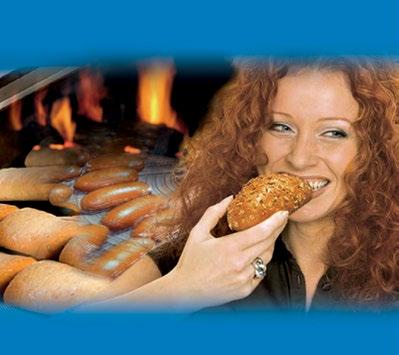
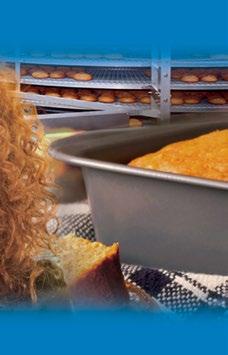
FROM SILO TO TRUCK You bake, we care TurnKey Concept www.kaakgroup.com



































































 Specialists in food processing equipment
Specialists in food processing equipment



































